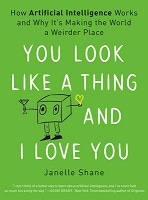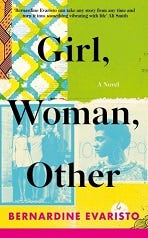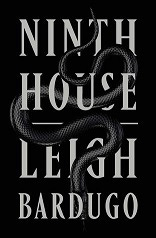January 2020 Books and Stuff
January has been a confusing month, with record warm temperatures in Boston that cooled off quickly enough to kill the battery in my car (which was thankfully revived by AAA) while I was away visiting my colleagues in Charlotte, NC.
Books You Might Want To Read

I have 4 books to rave about this month, starting with Janelle Shane’s You Look Like A Thing And I Love You: How Artificial Intelligence Works and Why It's Making the World a Weirder Place. I’ve been a fan of Janelle for a while, with her hilarious examples of neural nets producing everything from ice cream flavors to crochet hat patterns. This book is full of those LOLworthy examples, but it’s also got some really clear, explanatory writing about complex technology. She provides some simple rules for understanding whether a problem is a good fit for machine learning and some great stories about how AI algorithms cheat. This is a book about technology that I would recommend to tech-loving and less-technical folks alike.

Next up is Bernadine Evaristo’s Girl, Woman, Other, winner of the 2019 Man Booker Prize. I should warn you that Evaristo decided to do this one without punctuation, and ordinarily I would have issues with that, but when you write this well you get to break any rules you want. This is a chronicle of black life in Britain. It jumps around in space and time with a chapter focused on each character, but the entire thing is masterfully tied together. Many of the characters were interesting enough that I’d read a whole novel about them. One of the big eye-openers for me was the different nature of racism in Britain compared to America. If you’ve been following the Sussex royals saga, this is an especially timely read.

Back to tech, I also got drawn into Mindf*ck: Cambridge Analytica and the Plot to Break America by Christopher Wylie. The title is apt because there’s a whole lot in here that nobody would believe if you’d written it as fiction. Wylie provides a really solid explanation of how Cambridge Analytica broke Western democracy, and also of how he didn’t fully understand what they were doing until it was too late. He was only twenty-four when he got into this. At that age, I was working for startups as the dot-com bust unfolded, and I can relate to putting up with some crazy shit at the office because you’re too inexperienced to know better. Most of us are just lucky that our crazy bosses were less connected than Wylie’s. Kudos to him and the journalists who worked with him to get this story out there.

Finally, a delightful bit of genre fiction is Leigh Bardugo’s Ninth House. I go back and forth on how much I like paranormal fantasy, but read this one if you like the genre even a little. It’s probably even better if you went to Yale, which I did not, but I grew up an hour away and have visited the area a few times. Bardugo’s New Haven is dripping with magic and mayhem centered on Yale’s secret societies (which are real, but she’s taken some liberties with the details). It was a little slow going at first, but I stayed up way too late finishing it. And there’s pretty clearly going to be a sequel.
Email Newsletters To Check Out
Now that Google and Facebook have killed blogging, I’m starting to get into email newsletters. I haven’t yet made the leap of paying someone actual dollars to add to my email inbox, but there are a few that I have been really enjoying recently.
BIG by Matt Stoller is all about monopolies. Not the board game, the companies that dominate many industries. Stoller writes about the usual suspects in tech and media, but he has also tackled industries like competitive cheerleading.
I’m also hooked on Normcore Tech by Vicki Boykis. Boykis is a data scientist I first encountered on Twitter - she tweets some hilarious stuff, but her long-form writing is also top-notch. This recent story about the Russian developers of the open source Nginx project was particularly eye-opening. High nerd quotient on this one.
Reading The Talmud
So, I was browsing leftist rabbi Twitter one day (if you’re Jewish and not enjoying leftist rabbi Twitter, you’re missing out) back in December and I learned that there was a global page-a-day Talmud book club. It’s called daf yomi and the idea is that if you read a page of the Talmud every day, you can finish it in seven and a half years. Conveniently, a new cycle started on January 5 of this year. I’m not exactly sure why I thought this would be a good idea, but now I’m reading the Talmud and I’m going to finish when I’m 50. Yikes.
I’m using the iOS app from Sefaria.org, which is really great (and free, even). This is the first time that a cycle has started with an English translation available online, and having the app makes a big difference. I joined a temple friend’s Facebook group to discuss the readings and I’ve also found a few Twitter accounts that are having a good time with the material so far. I’ve historically not been great at daily habits (my past is full of page-a-day calendars that sat unused after Jan 12 or so) but this one is off to a good start. Still, seven and a half years is a darn long time, so we’re really just scratching the surface right now.
So?
This is a bit of an experiment to make myself write more. I polled a group of book-loving friends and they said it was a great idea, but maybe they just didn’t want to hurt my feelings, you never know. Feedback is much appreciated, leave a comment here or email me (blinker at gmail) or hit me on whichever social media sites we chat on.
